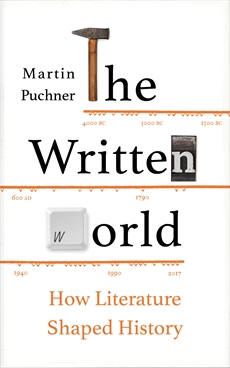Martin Puchner, author of The Written World: How Literature Shaped History selects ten books that he believes have strongly influenced the course of world history.
Epic of Gilgamesh
The Epic of Gilgamesh is the first significant text in world literature, and a perfect example of the power of written stories to shape history. By bolstering cultural cohesion across the region, the epic helped maintain the earliest territorial empire. Written in cuneiform, it disappeared without a trace because it was never transcribed into any other writing system, until it was rediscovered by accident two thousand years later. Saddam Hussein, a keen student of history, wrote a novelistic adaptation of the epic. To his great surprise, it failed to secure the survival of his regime.
Ezra’s Bible
Written texts became increasingly important for Jewish life during exile in Babylon, the most literate place on earth at the time. When the scribe Ezra led his followers back to Jerusalem, he held up him Torah scrolls and demanded that the returning exiles bow before them as they would to a god. It was the beginning of sacred scripture, giving rise to Judaism, Christianity and Islam. We have been living in a world shaped by sacred texts ever since.
Diamond Sutra
The Diamond Sutra commemorates the life of the Buddha by portraying his interactions with students and his daily habits in unusual detail. When the sutra was committed to writing long after the death of this great teacher, it became so influential that devoted monks carried it all the way to China. It was here that the Diamond Sutra encountered paper and print. With the help of these technologies, it spread to Korea, Japan and beyond, making Buddhism a world religion.
Tale of Genji
This multi-generational tale, written by a lady-in-waiting at the Japanese Court, is the first great novel in world literature and radically expanded literature’s ability to capture complex emotions and subtle interactions. Giving its readers unprecedented access to the secluded lives of women at the Heian court, the novel shaped Japanese culture for hundreds of years, though Western readers didn’t have access to translations until the late nineteenth century.
Thousand and One Nights
Story collections throve across the ancient world from India to Greece, but none became as popular as the Thousand and One Nights, with its famous frame tale featuring Scheherazade, her sister and the murderous king. Aided by the arrival of papermaking from China, this collection captured the imagination of the Arabic world and, centuries later, of Europe. Continually adding new stories, it ultimately became the world’s greatest store of stories, adapted and repurposed ever since.
Popol Vuh
The Popol Vuh is the high-water mark of Maya literature, the only literary tradition to develop without contact to the Eurasian continent. When Spanish conquistadors encountered Maya books, they tried to burn them all. But Maya scribes secretly translated their most precious epic into the Latin alphabet and hid it away, hoping to preserve it for the future. The epic resurfaced in the twentieth century and served as an inspiration to Subcommandante Marcos and the Zapatista revolt in Southern Mexico.
Declaration of Independence
Written by Thomas Jefferson and improved by committee, the Declaration of Independence combined Enlightenment ideas with a history of grievances and slights. Benjamin Franklin, who contributed the term ‘self-evident’ to its famous second sentence, made sure the text swiftly reached readers with the help of his media empire, which included paper mills, printers, newspapers and a network of postal roads. The Declaration of Independence became the model for many similar declarations around the world, from Haiti to Vietnam.
Communist Manifesto
When Marx and Engels wrote the Communist Manifesto at the behest of a small group of exiled revolutionaries based in London, they knew they wanted to change the world. They just didn’t know whether they would succeed. Combining a grand story of humankind with a rousing call to action, the Communist Manifesto was ignored for decades, until it found readers ready to carry out its revolutionary program in the early twentieth century. Despite this initial delay, no other text in world literature has had so much impact in so short a time.
Epic of Sunjata
Legendary Sunjata founded the Mali Empire during the late Middle Ages, but the epic commemorating his deeds was transmitted orally for hundreds of years before it was written down in the twentieth century. As an oral story, the Epic of Sunjata connected the lives of its listeners to a glorious past, and as a written text it fueled the struggle against French colonialism that ultimately led to independence.
Akhmatova’s Requiem
Akhmatova knew that she would not be allowed to write about life under Stalin, and that she would be arrested if such as text were found in her apartment. These adverse circumstances did not prevent her from creating Requiem, her long poem about the gulag. She memorized it and burnt the paper on which she had composed it. She then taught the poem to her female friends so that it might survive her own death. The poem was circulated in secret samizdat copies and helped bring about the demise of the Soviet Union.
Martin Puchner’s The Written World: How Literature Shaped History is published this week by Granta Books.
Feature Image © Loren Kerns







